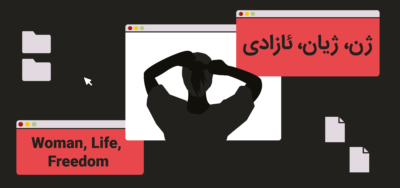Digital segregation, or granting different levels of access to the global internet for those inside Iran based on their occupation, gender, age, or other characteristics (also known as layered or tiered filtering) has made its way from the periphery to the center of Iran’s internet policy with such force that in recent months that hardly a week or month goes by without a new development.
This month, ICT Minister Eisa Zarepour made an announcement about a “special SIM card” for tourists with access to blocked platforms (such as Instagram and WhatsApp). The discrimination against the people living inside Iran – who have been enduring months of even more severe internet restrictions than usual since the September 2022 protests – was so blatant that the next day the ICT Ministry swiftly downplayed it as a “suggestion” stating that “no decision was made about it.”
Earlier this month, Zarepour also commented that providing teachers and academics with high speed internet and access to certain blocked content was a “duty” placed on the ICT Ministry by the Committee for Determining Instances of Criminal Content (CDICC) – the so-called filtering committee. Mohammad Zelfi-Gol, Minister for Science, Research, and Innovation, had also confirmed a day earlier that the ICT Ministry would grant teachers and academic staff access to some blocked content.
The developments around layered filtering are happening at the same time as certain MPs in Majles (parliament) have been attempting to revive the “User Protection” bill. More updates and news around the latest internet policy issues in February 2023 are highlighted below.

Amin Aghamiri Appointed as the New Secretary to the Supreme Council for Cyberspace
On 25 February, President Ebrahim Raisi appointed Mohammad-Amin Aghamiri as the new Secretary to the Supreme Council for Cyberspace (SCC). His mandate includes oversight of e-government projects, the development of the National Information Network (NIN), data protection, among a list of other issues. Agahmiri replaces Abolhassan Firouzabadi who resigned after 11 years in that role.
The “Personal Data Protection” Bill Passed to Cabinet for Proposal to Majles
On 19 February it was reported that the draft “Personal Data Protection” Bill which was developed by the ICT Ministry’s Special Economic Working Group was approved and passed over to the Cabinet before it could be presented to Majles (parliament).
Parliamentary Research Centre Opposes Plans to Create Development Fund for the National Information Network in the New Budget
On 1 February Iranian tech news outlet Digiato reported that the Parliamentary Research Centre had opposed plans for the creation of a development fund for the National Information Network (NIN) in the budget for the next Iranian calendar year (March 2023 – March 2024). The reason given by the Centre is “possible deviation from the budget’s performance in the ICT sector” and asked for the proposal to be removed from the draft budget.
Majles Makes Attempts to Clarify Audio-Visual Regulatory Authority’s Legal Position
According to a report by the Iranian tech news outlet Peivast on 19 February, the Parliamentary Budget Review Commission – which is currently reviewing the draft budget for the next Iranian calendar year (March 2023 – March 2024) – is making attempts to give legal standing to the Audio-Visual Regulatory Authority (SATRA) which operates under the state broadcaster, the Islamic Republic of Iran Broadcasting (IRIB).
There have been protracted disputes over the role of SATRA in overseeing video-on-demand and video streaming services given that the body operates under the IRIB. The dispute came to a head in recent months as SATRA requested for certain online streaming services to be blocked, while streaming and video sharing services disputed SATRA’s legal authority to do so. It now appears that the Majles is supporting SATRA’s position via the current draft budget. The draft budget refers to SATRA’s authority to issue licenses for online audio and visual content; the body has also been given one month from the ratification of the budget to provide the Cabinet with regulations for audio-visual broadcasting platforms.
Plans for Special SIM Cards with Unrestricted Internet for Tourists
On 23 February Eisa Zarepour mentioned plans for a “special SIM card for tourists” which includes unrestricted access to the internet that includes access to platforms such as Instagram and Telegram which are blocked for ordinary internet users in Iran. Following backlash Zarepour made an additional statement the next day claiming that this scheme “was not confirmed” and was a “suggestion.”
Blocking of Platforms “Under Review” According to Iran’s ICT Minister
According to the Iranian tech news outlet Peivast, on 2 February, Iran’s ICT Minister Eisa Zarepour commented that as per an order from President Ebrahim Raisi the Committee for Determining Instances of Criminal Content (CDICC) will be reviewing blocked content and services to assess if they could be unblocked.
15 Percent Custom Charge for Mobile Phones Worth over 600 US Dollars
According to Rahim Zarah, the Spokesperson for the Parliamentary Budget Review Commission, which is currently reviewing the draft budget for the next Iranian calendar year March 2023 – March 2024, on 7 February, a 15 percent custom charged will be imposed on imported mobile phones worth over 600 US dollars.
Iran’s Customs Agency Announces Ban on Imports of iPhones 14 and above
On 13 February Iran’s Customs Agency announced a ban on the importation of iPhones 14 and above via post or passengers from 20 February 2023. These phones cannot be registered inside the country and, therefore, cannot be used. No official reason was provided for the ban.
Parliamentary Research Centre Calls for Plans to Be Made for Spending New Mobile Phone Customs
On 1 February the Parliamentary Research Centre called for the President’s Deputy for Science and Technology and the Ministry for Industry, Mine, and Trade to “develop a comprehensive plan to promote the country’s microelectronics industry.” According to the Centre, the funds received from the new mobile phone fee should be dedicated to this industry.
New Private Sector Candidates Proposed for Regulatory Commission Membership
On 15 February the Iranian tech news outlet Peivast reported that in the letter to the ICT Minister, Iran’s Computer Guild had proposed three new private sector candidates for membership with the Regulatory Commission. Earlier, the two private sector representatives at the Commission – Shahab Javanmardi and Hossein Mirzapour – left to “avoid conflicts of interest.”

Iranian Cryptocurrency “Digital Rial” Enters “Test Phase”
On 20 February, Mohammas Arbab Afzali, the Head of Payment System Oversight at Iran’s Central Bank announced the pre-test phase for Iran’s cryptocurrency, the Digital Rial has ended and the currency is now in its first test phase. Nine additional banks including Meli, Melat, and Tejarat banks have requested to add their digital wallets to the Central bank.

ICT Minister Blames Internet Shutdowns on Cyber Attacks
During an interview on 2 February, Iran’s ICT Minister, Eisa Zarepour claimed that a 10 minute nationwide internet shutdown which happened in January was due to a “cyber attack” but the source of the attack is still “under investigation.” Filterwatch cannot independently verify Zarepour’s claim.
Iran’s ICT Minister Comments on Extensive Cloudflare Outage
On 20 February, Iran’s ICT Minister, Eisa Zarepour commented on an extensive outage on Cloudflare – which offers CDNs, cloud cybersecurity, and DDoS mitigation – a day earlier. Some suspected that the disruptions were due to government filtering efforts as some VPNs use the company’s CDNs. Zarepour claimed that the disruption had been resolved and denied any blocking efforts in relation to Cloudflare.
National Centre for Cyberspace Confirms an Alleged 57 Percent Progress for the National Information Network
On 6 February the Spokesperson and Legal and Parliamentary Affairs Deputy at the National Centre for Cyberspace (NCC) Amir Khorakian confirmed an alleged 57% progress of the National Information Network (NIN), claiming a 23% progress since the start of the Raisi administration.




